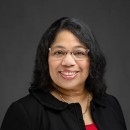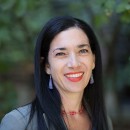Faculty News
Pages
 Roland Zullo Talks with WEMU About Michigan’s Right-to-Work Law
Roland Zullo Talks with WEMU About Michigan’s Right-to-Work LawAssociate Research Scientist Roland Zullo discussed Michigan’s right-to-work law with WEMU. “Repealing right-to-work certainly helps the labor movement on a couple of levels. But the main one,” said Zullo “is that it shows that labor has regained a little bit of political power in this state.”
- March 16, 2023
- Learn more »
 Camille Quinn Honored with University of Chicago 2023 Milestone Achievement Award
Camille Quinn Honored with University of Chicago 2023 Milestone Achievement AwardAssociate Professor Camille Quinn will receive the 2023 Milestone Achievement Award from the University of Chicago’s Crown Family School of Social Work, Policy, and Practice. The Milestone Achievement Award honors Crown Family School alumni for their exemplary social work values, exceptional performance in clinical or administrative practice, and a strong commitment to the social work profession.
- March 14, 2023
 Erin Martinez-Gilliard Writes New Book on Sex, Social Justice and Mental Health Practice
Erin Martinez-Gilliard Writes New Book on Sex, Social Justice and Mental Health PracticeLecturer Erin Martinez-Gilliard’s new book, “Sex, Social Justice, and Intimacy in Mental Health Practice: Incorporating Sexual Health in Approaches to Wellness,” will be released on March 21. The text equips mental health professions to integrate discussions about sexual health, identity and relationships into the scope of their client’s mental health.
- March 14, 2023
- Learn more »
 Daphne Watkins Edits New Book on Global Strategies for Promoting Health in Boys and Young Men of Color
Daphne Watkins Edits New Book on Global Strategies for Promoting Health in Boys and Young Men of ColorProfessor Daphne Watkins is the co-editor of “Health Promotion with Adolescent Boys and Young Men of Colour: Global Strategies for Advancing Research, Policy, and Practice in Context.” The book unpacks the complex intersections between age, race and gender in the diverse lives of young males of color.
- March 7, 2023
- Learn more »
 Paula Allen-Meares Speaks with WNIJ About Using Poetry to Increase Health Awareness
Paula Allen-Meares Speaks with WNIJ About Using Poetry to Increase Health AwarenessDean Emerita Paula Allen-Meares spoke with public radio station WNIJ about an initiative in Rockford, Illinois using poetry to increase health awareness. The six-part video program was created in partnership with the University of Illinois in Chicago, of which Allen-Meares is chancellor emerita.
Allen-Meares has a long history of using the arts as an avenue to advance social work. During her tenure at the School of Social Work, she established the School’s groundbreaking and influential art collection.
- March 7, 2023
- Learn more »
- Rebeccah Sokol’s Research Receives CDC Funding
Assistant Professor Rebeccah Sokol is the principal investigator of a three-year project recently funded by the CDC entitled “Evaluating a school-based social and material needs identification system to prevent youth violence involvement.” The project will evaluate the effect of Pathways to Potential (P2P) on youth violence outcomes by using administrative data sources and surveys of key program staff. P2P is a Michigan Department of Health and Human Services program that seeks to improve school communities’ social conditions by identifying and reducing the level and concentration of risk factors for chronic absenteeism. Professor Joe Ryan is a co-investigator of this project.
- February 22, 2023
- Learn more »
 Trevor Bechtel Speaks with Michigan Radio About How Guns Control Affects Law Enforcement
Trevor Bechtel Speaks with Michigan Radio About How Guns Control Affects Law EnforcementLecturer Trevor Bechtel, PhD ‘08, spoke with Michigan Radio’s Stateside about how the prevalence of guns in our society affect police interactions. Bechtel is also the Student Engagement & Strategic Projects Manager at U-M’s Poverty Solutions and is a co-author of their recent report examining the use of force by law enforcement.
- February 21, 2023
- Learn more »
 Luke Shaefer Talks to Michigan Radio about Poverty Solutions Report on Police Use of Force
Luke Shaefer Talks to Michigan Radio about Poverty Solutions Report on Police Use of ForceProfessor Luke Shaefer spoke with Michigan Radio about a new report from U-M’s Poverty Solutions, which shows that U.S. police officers kill more people in days than police in other countries kill in years. “This is one place where, if we’re trying to see things from the perspective of police … that fear, that vigilance really of anyone and everyone that they encounter may have a gun does look like it drives more police shootings,” he said. Shaefer is Poverty Solutions’ faculty director and one of the authors of the report.
- February 8, 2023
- Learn more »
 Andrew Grogan-Kaylor Discusses the Endurance of Corporal Punishment in The Lancet
Andrew Grogan-Kaylor Discusses the Endurance of Corporal Punishment in The LancetProfessor Andy Grogan-Kaylor is quoted in a feature in The Lancet Child & Adolescent Health titled “The strange endurance of corporal punishment.” The article explores the fact that while corporal punishment of children is an extremely loaded issue that transcends cultures, the research is almost entirely uniform in finding that corporal punishment doesn’t work and has enduring negative effects on children. “Using spanking might buy you an hour of quiet or an hour of better behaviour,” Grogan-Kaylor said. “But over the course of the long term, it'll lead to all kinds of problems.”
- January 31, 2023
- Learn more »
 Luke Shaefer Speaks with the Detroit News on the Earned Income and Child Tax Credit
Luke Shaefer Speaks with the Detroit News on the Earned Income and Child Tax CreditProfessor Luke Shaefer was quoted in a Detroit News article on how the Earned Income and Child Tax Credit can make a critical difference for families with low to moderate incomes.
“This is an important time of year for households who are working hard to make ends meet,” said Shaefer. “Tax refunds help families pay down debt, invest in car repairs, and all the other things they need. We all benefit when families can access these resources.”
- January 31, 2023
- Learn more »